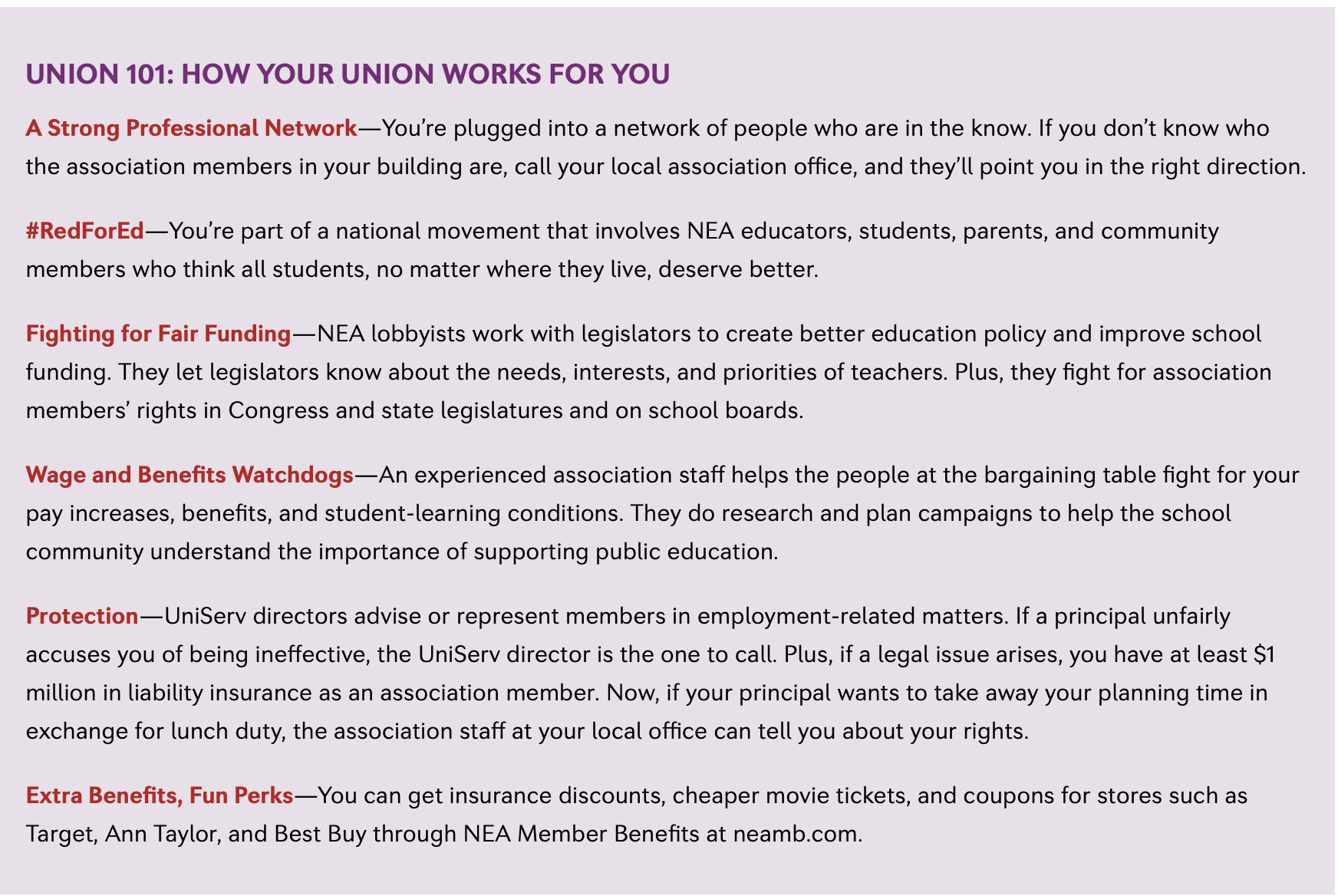
Your college and student teaching experiences coupled with your involvement in NEA Aspiring Educators are the first building blocks toward a long and successful career. You may have already aced your college courses, knocked student teaching out the park, or built a strong NEA chapter. And as you head into your first full-time job, you are likely to find great fulfillment in your work, and you should also expect some moments of confusion and turmoil as you go through your teaching life cycle.
As an NEA member—post graduation—you’ll have a support system in place to help you grow professionally and navigate the different stages of your career. Here’s what to expect—and what to do when you face the unexpected— as you make your way to your first classroom and beyond.
In College: NEA Supports Young Educators
Build a Professional Network: The first step of your teaching journey actually starts now, through your NEA Aspiring Educator chapter. It’s more than a cool club on campus and a source of liability insurance. It’s a professional organization that’s connected to your state association—also called a union in many states—and the 3-millionmember NEA. Through your campus chapter, you reap the benefits of membership, including access to workshops that boost your teaching skills and opportunities to meet and share ideas with other NEA Aspiring Educator members.
Make Strong Connections: Your campus chapter’s connection with the state association means you can meet practicing classroom teachers who will help you feel more comfortable as a future educator. Most state associations have early career educator (ECE) groups that directly support aspiring educators. For example, Ohio’s New Educators—an arm of the Ohio Education Association—has a mentorship program that pairs aspiring educators with a “buddy” who provides job-prep support, coaching, and access to conferences and retreats. Check with your state student organizer or look in your new teacher handbook to learn more.
Get Help with Your Job Search: When considering where to work, call the local association to learn more about a school district and its expectations, as well as the wider community. Also, remember that you are interviewing the employer at the same time that they are interviewing you. The local staff can advise you about the right questions to ask to find out what a job offers you: Do I have a mentor through the district? What professional learning opportunities are available to me? What are the choices within your pay scale? What are the retention rates for new teachers in the district or school? And the list goes on … .

You Landed Your First Job! Now What?
Know Your Rights: As you launch your career, it’s important to know your rights as a school employee and union member. Are you allowed to team up with other educators to negotiate your salary and benefits—a process called collective bargaining? How should you report a problem with a school administrator? What’s the best way to advocate for your students?
Laws vary from state to state, so find your building representative (See glossary on Page 14) in your school or call your local or state association to find out your rights in your state.
Create a Support Network: Being a new educator is exciting, joyful, and also very challenging. About 40 percent of new educators leave the profession within the first five years. But the best way to beat burnout is to build a support network. Forming bonds and friendships with other members with similar interests—such as community outreach, networking, local organizing, social justice advocacy, and political action—can give you the support you need to enjoy a long teaching career.
Early career educator groups are working hard to keep young educators in the classroom. Take FYRE (Florida’s Young Remarkable Educators)—a group affiliated with the Florida Education Association—that’s creating an inclusive environment and a safe space for educators who are in their first 10 years of teaching. Check with your local or state union to see if a similar group exists in your area. If it doesn’t consider starting one!
Get Professional Training: Relevant professional learning comes from all corners of the association, from ECE groups to the national level—all of which help you become proficient in your classroom. NEA’s Center for Great Public Schools offers programs such as Early Career Learning Labs, a blended learning environment focused on instructional and classroom problems of practice.
You can also get certified in one of NEA’s micro-credentials—online trainings in topics such as art integration, bully-free schools, classroom management, or teacher leadership. For more information, visit nea.certificationbank.com.
You’re Ready for More
Make Your Big Ideas Bigger: At this stage, you’re not so new anymore, and you know who to call when the going gets a bit tough. But what if you’ve got a great idea and need some help to pull it off? Maybe it’s a great membership drive or local workshop. You have resources available to take your idea to the next level! First, work with your building rep. Then contact the regional UniServ director (See glossary). They work on special projects all the time. And call your state president and ask for support.
Legislation and Lobbying: Want to see better schools, higher teacher salaries, and improved benefits? Nationally and within your state, NEA is one of the most powerful lobbying organizations for our students and schools. Every day during the legislative session, you can be sure that association representatives are supporting pro-education legislation and working to defeat anti-education measures.
Your state association is very active in education reform and teacher certification. You can add your voice and be part of this important process—and you can invite others in your school to join you as well. Call your state government relations director or UniServ director and ask how you can help!
At the Finish Line
Retirement may seem ridiculously far away—and it is!—but financial experts say it’s best to start planning when you’re young. And, even then, you won’t stop caring about students and educators. Just ask the more than 300,000 NEA-Retired members who are working to improve public education through mentoring, literacy, and intergenerational programs and activities. They also fight alongside current educators to achieve legislative and political action goals. And they work to protect and improve retirement pension, and health benefits—including state pensions, Social Security, and Medicare—so young people like you will still have these safety nets when you get ready to retire.
Today, you may be midway through your college courses or powering through student teaching, but once you graduate, NEA will continue to open doors to support and camaraderie throughout your entire NEA membership.

